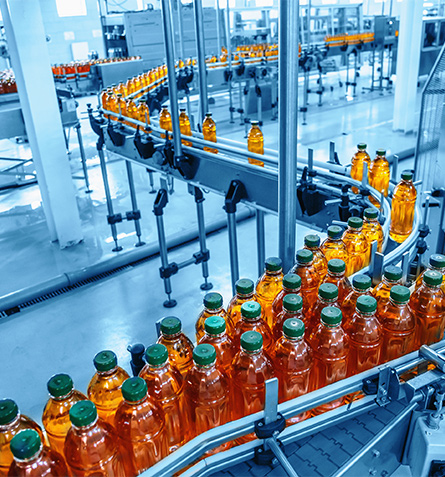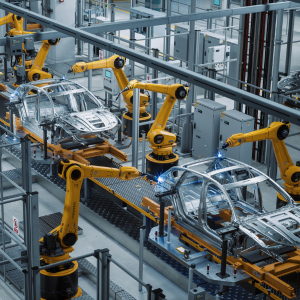Blockchain in Manufacturing
Post By: Ryan King On: 01-09-2020 - Industry 4.0 - Industry Trends
What Is Blockchain?
In the simplest possible terms, it's a chain of blocks, but of digital data rather than concrete. This data forms a distributed ledger of transactions that are carried out and verified by participants (or nodes) in the network, and creates records every time a transaction is entered. Whenever an update to the ledger is submitted, an automated process is triggered which requests the approval of the other nodes. Approved, updated records are time-stamped, signed cryptographically and added to the block. They're safe from tampering, but most importantly they're decentralised. Unlike more typical data networks, there is no single central core that controls the rest.

Why Choose Blockchain?
Blockchain provides a transparent and far more secure method of recording and storing transactions. Every time an event takes place in the life of a product, or a service operation is transacted, a new block of data gets added to the chain, which will be there permanently and can be seen by all participants. The information is heavily encrypted so that the transactions are protected from tampering.
Blockchain offers greater resilience because the ledger is permanent and distributed across the network in multiple locations. This means it can continue to function even if some network element fails, or if any one participant leaves the chain. Furthermore, there is no third-party intervention. Blockchain enables direct, business-to-business (B2B) transactions, cutting out the middlemen and simplifying the entire process.
Blockchain Yn Manufacturing
In the smart factory, automated controllers share data from a complex network of machinery, parts and processes. There are many participants in the value chain, including designers, logistics companies and machinery providers. Blockchain can register and monitor every stage of the manufacturing process as it turns a collection of components into a finished product.
Blockchain could help to mitigate risks, such as tracking down faulty parts. Manufacturing processes rely on the supply of multiple contributory components to produce larger pieces of equipment, and these can be sourced from suppliers and agency networks worldwide. Blockchain not only provides the means to see every component on the supply chain, but it does so in real time. This gives manufacturers the chance to identify any problematic elements before they are incorporated into the process.
Smart Contracts
These contracts constitute tamper-proof agreements that may be made between two or more parties, and are entered as a transaction on the blockchain. Smart contracts have terms and conditions pre-set into them, and the contract executes automatically when these are met. They verify that their own conditions have been correctly carried out, monitor the performance of the agreed terms, and automatically release funds to the appropriate parties once the contract is complete.
Supply Chain Management
Smart contracts can incorporate an entire end-to-end transaction. This may include multiple transacting parties who participate at any point through the supply chain. All parties may see the whole extent of the transaction, whose value and terms are fully integrated into the contract. Each stage of the supply and delivery process is recorded on the blockchain ledger once its conditions are met.
Blockchain technology is valuable to purchasers of source goods, as its transparency ensures the authenticity of critical credentials. These may include certificates of approved quality, status documents, and authorisations, which cannot be forged or tampered with. Source goods can be tracked as they pass through the supply chain by means of transit documents, RFID tagging and verifiable audit trails.
Manufacturers can access these real-time activity logs to monitor the passage of source parts and finished goods. All purchases, sales and inventory can be monitored by all parties, helping to overcome the nuanced complexity of traditional supply chains. Manufacturers are also moving away from the old service model, where parts are replaced only after they fail, to a pre-emptive purchase model which maximises systems uptime.

Streamlining
Blockchain could benefit industrial processes, as manufacturers begin to leverage the IIoT and use predictive analytics. The smart factory will provide information on the equipment, its parts, and service schedule. These can be registered and stored on the blockchain, together with predictive maintenance cycles that ensure equipment is proactively repaired before it breaks down.
The increased level of visibility offered by the distributed ledger will also allow the whole global service chain to track replacement parts, ensuring they are supplied in time for repairs to be made. Blockchain can execute any form of smart contract automatically, provided it is triggered by measurable terms or conditions. Thus it can monitor timely delivery of goods and equipment performance, and automatically carry out repetitive processes such as scheduled maintenance cycles.
Transparency
Trust has always been an issue between buyers and sellers, and used to involve complex relationships being built up over time. The quality of products had to be assessed and certified, the delivery times shown to be reliable, and payments made as agreed and in a timely fashion. Blockchain takes the fear and hesitation out of these relationships, and does not require years of dealing to acquire a stable of trusted suppliers.
Since every transaction on the ledger must be validated by the network, the blockchain is the sole version of the truth. It's wholly transparent, which guarantees the trust of all participants. Where critical data needs to be captured, stored and shared securely, the distributed ledger technology provides the level of trust that might otherwise be lacking between parties.
Intellectual property relating to innovation in design, for example, is a secret usually kept well guarded, but in this manner, ownership can clearly be demonstrated. Manufacturers can also use blockchain technology to develop new types of business model, as well as extending the boundaries of traditional production far beyond the factory floor.
Innovation, Efficiency, Security and Trust
Blockchain significantly enhances transparency and trust between participants in the manufacturing process. It benefits innovation in design and can be integrated into current processes to improve efficiency and security. Adopting blockchain is not without risk, as existing IT processes, legacy systems and infrastructure will have to be overhauled and will require considerable investment, but its benefits are manifest.
Get More From Rowse Straight To Your Inbox




